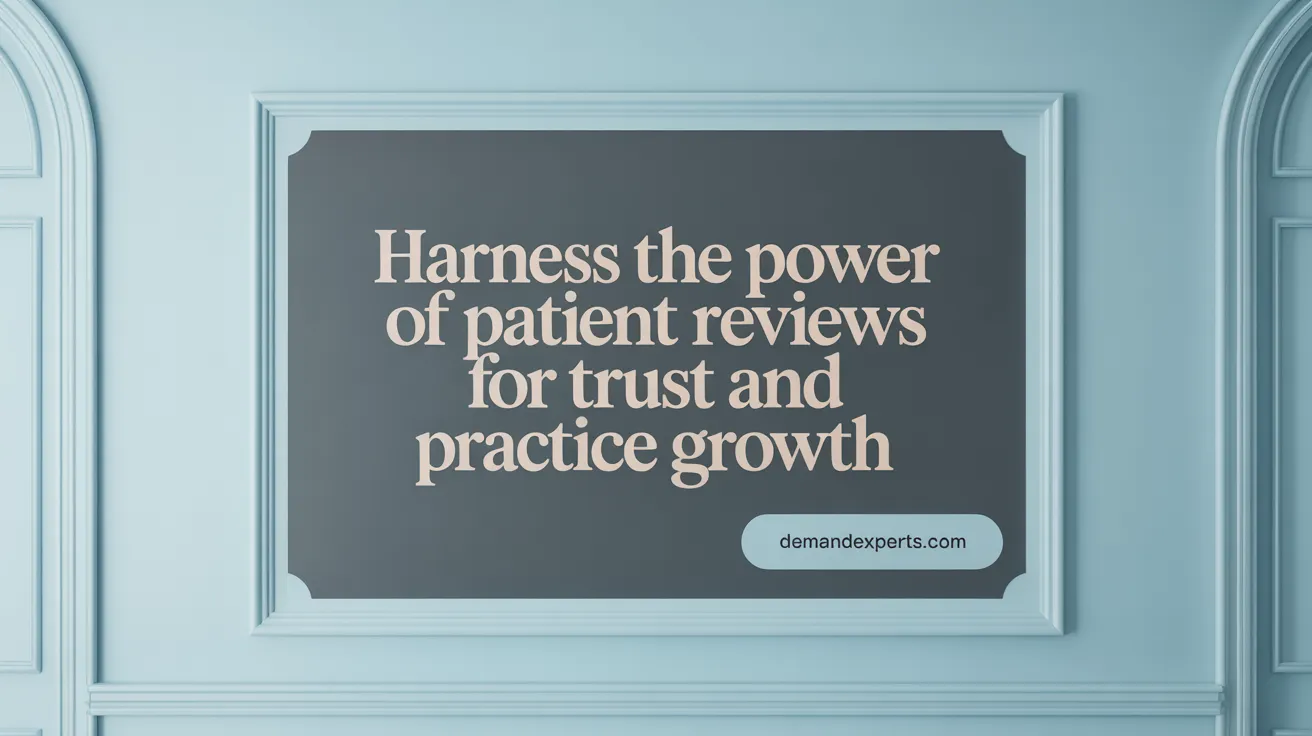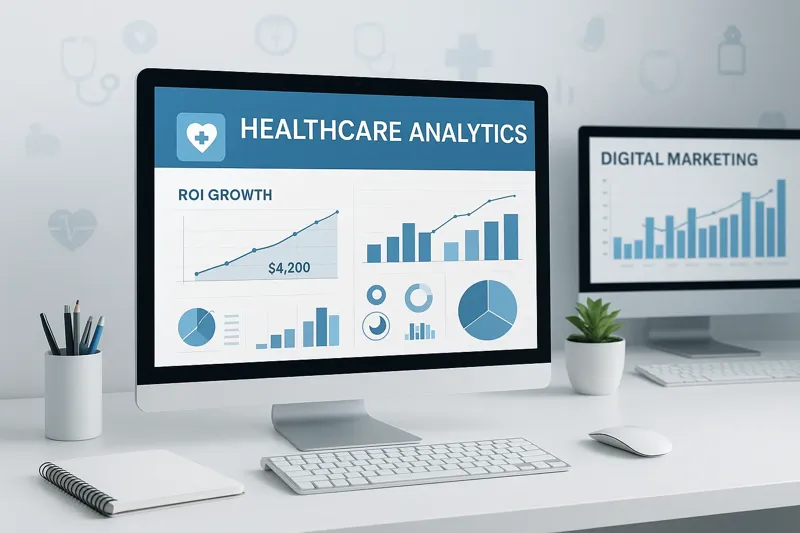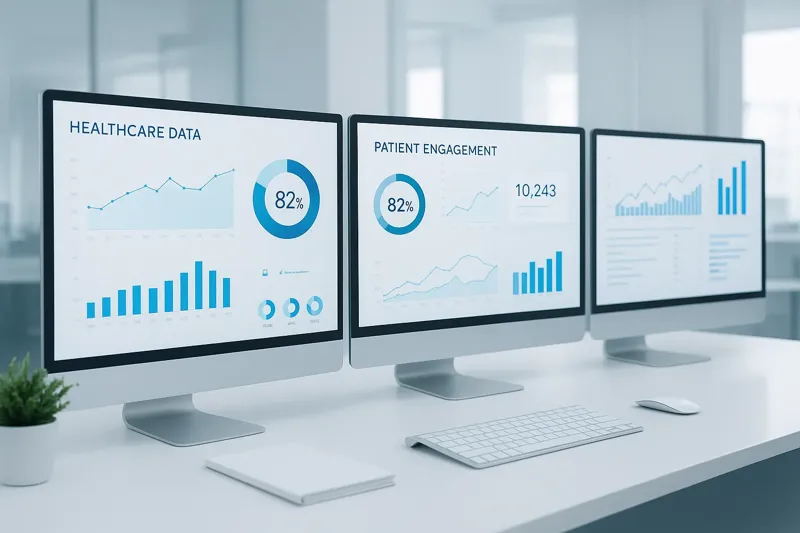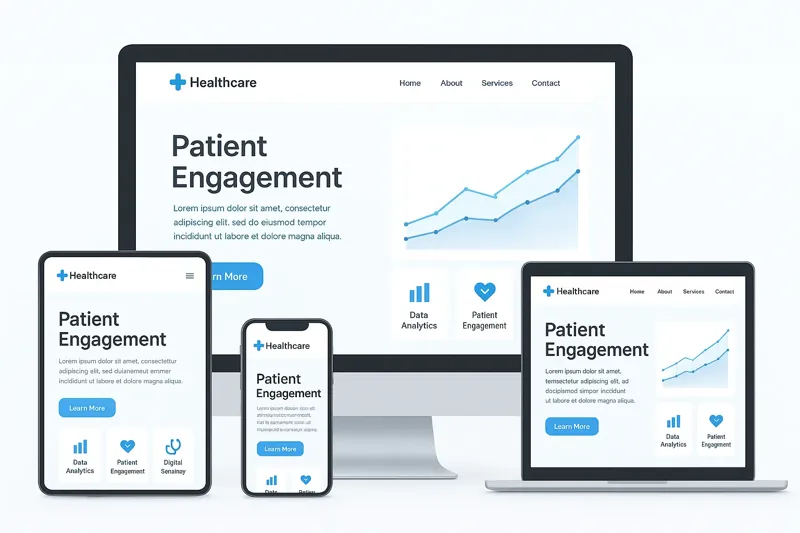Why Your Healthcare Practice’s Online Reputation Matters Today
The Critical Role of Online Reputation in Healthcare Practices
In today’s digital landscape, a healthcare practice's online reputation is pivotal for attracting and retaining patients. With approximately 83% of patients using search engines to find healthcare providers, and 94% consulting online reviews, the digital footprint directly influences patient choice and trust.
Influence of Online Reviews on Patient Decisions
Online reviews serve as social proof, guiding patients in their selection of healthcare providers. Over 70% of patients report that positive online reviews significantly affect their provider choice. High star ratings and a large volume of reviews not only enhance patient trust but also improve search engine rankings, increasing practice visibility.
Relevant Statistics Underpinning the Importance
- 84% of patients use online reviews as a primary resource when seeking healthcare.
- 59% consider physician ratings as "somewhat" or "very" important.
- Search engine and social media influence decisions for more than 40% of healthcare consumers.
The confluence of these factors highlights why maintaining a positive online reputation is essential for healthcare practices to stay competitive, trusted, and to ultimately drive patient growth.
Understanding the Digital Landscape of Healthcare Reputation

What is online reputation management for healthcare providers?
Online reputation management (ORM) for healthcare providers involves actively monitoring and managing what patients and the public say about physicians and medical practices across digital channels. This includes search engines, social media platforms, and physician rating websites. The goal is to influence public perception positively by ensuring accuracy, addressing negative feedback thoughtfully, and highlighting authentic patient experiences (Managing online reputation for healthcare providers; Improve healthcare reputation management; Online reputation management for physicians).
Why is online reputation important in healthcare?
Over 80% of patients research online before selecting healthcare providers, with up to 94% consulting online reviews as a critical factor in their decision-making. Positive reviews and ratings significantly build patient trust, increase appointment bookings, improve search engine rankings, and ultimately support practice growth. Conversely, poor or nonexistent reviews can deter potential patients and harm revenue (Importance of online reputation for healthcare providers; Impact of online reviews on patient decisions; Healthcare reputation management platform).
Role of online reviews, social media, and physician rating platforms
Patients weigh online reviews heavily, with platforms like Google, Healthgrades, and Facebook serving as primary sources for feedback. Social media also influences patient choices by enabling providers to share educational content, engage with the community, and build a professional brand. Physician rating sites consolidate patient opinions, further impacting visibility and credibility (Healthcare digital marketing strategies; Physicians and online patient reviews; Community Health Needs Assessment).
Importance of search engine results and online presence
Most patient traffic and inquiries come from the first page of search results, making it essential for providers to optimize their online presence. This includes maintaining updated profiles on key directories, publishing health-related content, and cultivating social proof through patient testimonials. Proactive management helps push positive information higher in search results, reducing the impact of any negative content (Claim your healthcare business online; Online reputation monitoring for healthcare practitioners; Mastering Healthcare Reputation Management 2024).
Legal and ethical considerations
Healthcare providers must navigate HIPAA regulations carefully when responding to online feedback, avoiding disclosure of protected health information. Posting fake reviews or incentivizing false feedback is unethical and can lead to disciplinary actions. Best practices include encouraging honest patient reviews and responding to critiques professionally and compliantly (HIPAA and physician review responses; Responding to reviews within HIPAA guidelines; Protecting a physician's online reputation).
This strategic approach to digital reputation management ensures healthcare providers maintain trust and credibility, fostering measurable patient growth and competitive differentiation within the evolving digital healthcare landscape (Healthcare reputation management strategies; Online Reputation Management for Healthcare).
Building a Stellar Online Presence for Your Practice

How can healthcare practices establish a strong online presence?
Healthcare practices can build a strong online presence by creating a professional, mobile-optimized website that clearly displays essential information such as practice hours, location, provider bios, and services offered. Incorporating a secure, HIPAA-compliant patient portal adds both convenience and trustworthiness (Creating a professional healthcare website, Importance of a HIPAA-compliant website).
Claiming and maintaining accurate business listings on directories like Google Business Profile, Yelp, and Healthgrades is critical. These platforms not only improve visibility but also serve as key touchpoints where prospective patients read reviews and obtain contact information (Google Business Profile for medical practices, Managing Profiles on RateMDs and Healthgrades). Regular updates and active management of these listings ensure consistent and reliable information (Claiming and optimizing online listings).
Search Engine Optimization (SEO) plays a pivotal role in enhancing online visibility. This includes technical SEO elements such as mobile responsiveness, schema markup, and XML sitemaps, as well as keyword research to target relevant patient queries (Technical SEO for Healthcare Websites, SEO techniques for healthcare practices. Content optimization through regularly updated, unique healthcare content, including blogs and educational articles, helps demonstrate expertise and improve search rankings (Improving SEO with healthcare blogs, Publishing helpful healthcare content.
Utilizing social media platforms is another effective strategy to augment professional branding and patient engagement. Healthcare providers who maintain active accounts on platforms such as LinkedIn, Facebook, Instagram, and YouTube can share educational content, wellness tips, and practice updates that connect personally with patients while advancing their brand identity (Building a personal brand with social media, Using LinkedIn and YouTube for healthcare visibility, Engaging patients through social media).
Publishing well-crafted healthcare educational blogs and articles not only improves SEO but also positions the practice as a trusted source of medical knowledge. High-quality content fosters patient trust and encourages sharing, which further broadens the practice’s digital footprint (Educational Healthcare Content, Healthcare blog posts for patient education.
Together, these strategies—professional website design, optimized directory listings, robust SEO, active social media, and educational content publishing—create a comprehensive and effective online presence that attracts and retains patients while enhancing the healthcare provider’s reputation (Healthcare digital marketing strategies, Healthcare reputation management).
Leveraging Patient Reviews and Social Proof Effectively

How do patient reviews impact your healthcare practice’s reputation?
Patient reviews play a pivotal role in shaping a healthcare practice's reputation. They directly influence patient decisions by building essential trust and credibility. Practices with a higher volume of positive reviews paired with strong star ratings enjoy enhanced visibility through better search engine rankings, making them more likely to attract and retain patients. In fact, star ratings of 4.5 and above can increase patient confidence and lead to measurable growth in appointments and revenue (Impact of positive online reviews in healthcare, Importance of online presence for physicians).
What are ethical ways to generate and manage reviews?
Ethical review generation centers on encouraging honest and timely patient feedback. Healthcare providers should request reviews promptly after appointments, facilitating authentic patient perspectives without enticing or incentivizing false feedback. It is vital to avoid fake or non-patient reviews to comply with legal and ethical standards. Managing reviews must be conducted with professionalism, responding thoughtfully to feedback while strictly safeguarding patient privacy and adhering to HIPAA regulations (Responding to reviews within HIPAA guidelines, Handling negative reviews legally, HIPAA compliance in online review management. Employing healthcare reputation management software ensures secure handling of patient data and streamlines the process of monitoring and responding to reviews (HIPAA-compliant healthcare reputation platform).
Encouraging honest patient reviews and feedback
Proactively inviting satisfied patients to share their experience fosters a strong online presence. Healthcare practices can use automated review requests delivered via SMS or email through platforms designed for healthcare compliance (Automated review requests via SMS, Encouraging honest patient reviews and feedback. These tools make it easy for patients to leave verified, unbiased reviews that authentically reflect the quality of care (Increasing healthcare practice visibility with reviews.
Importance of review volume, star ratings, recency, and engagement
A robust online reputation incorporates multiple elements: a high volume of reviews demonstrates credibility, star ratings reflect quality perceptions, newer reviews show ongoing patient satisfaction, and active practice engagement through responses conveys commitment to patient care (Healthcare reputation management strategies, Patient review statistics and importance of recency.
Using reputation management software and automated review requests
Reputation management platforms help healthcare providers systematically collect and manage reviews across platforms like Google and Healthgrades. Automated systems facilitate timely, location-specific review invitations, ensuring feedback is genuine and well-distributed (Healthcare reputation management software, Online Reputation Management for Doctors, Reputation management tools in healthcare.
Sharing patient testimonials and success stories (while maintaining HIPAA compliance)
Highlighting positive patient testimonials and success stories strengthens social proof. However, it is critical to obtain patient consent and avoid disclosing protected health information to maintain privacy and comply with HIPAA (Responding to patient reviews professionally and HIPAA considerations, Sharing patient testimonials and success stories.
Impact of positive reviews on SEO and patient trust
Positive patient reviews increase a practice’s search engine ranking by signaling trustworthiness and high-quality care to search algorithms. This improved visibility not only attracts new patients but fosters lasting trust in the healthcare provider’s brand (Enhancing reputation through search engine optimization, Impact of Google reviews on healthcare SEO, Improving search rankings with social media and content.
Responding to Online Feedback: Navigating Challenges and Compliance
Why Respond to Both Positive and Negative Reviews?
Responding to online reviews is essential for healthcare providers to build trust and show commitment to patient satisfaction. Engaging with positive reviews reinforces patient relationships and encourages further feedback. Addressing negative reviews professionally demonstrates transparency and a willingness to improve, which can mitigate potential damage to the practice's reputation. For more information, see Managing online reputation for healthcare providers, Improve healthcare reputation management, and Mastering Healthcare Reputation Management 2024.
How Can Providers Respond Without Violating HIPAA?
Physicians are permitted to respond to patient reviews but must carefully avoid disclosing any protected health information (PHI). Responses should be general, polite, and avoid patient-specific details. Providers are encouraged to move detailed discussions offline, such as via private phone calls or secure messaging, to maintain patient confidentiality while resolving issues. Refer to Responding to reviews within HIPAA guidelines, Physicians and online patient reviews, and Online reputation management for physicians for guidelines.
What Are Best Practices for Managing Negative Reviews?
Negative reviews should never be deleted unless they contain inappropriate language or defamatory content. Instead, acknowledge patient concerns respectfully and offer to address the issues privately. This professional approach shows responsiveness and may prevent further dissatisfaction. Practices should also evaluate underlying causes of negative feedback to improve the patient experience. Learn more in Healthcare reputation management strategies and Protecting a physician's online reputation.
How Should False or Defamatory Reviews Be Handled?
If reviews are false or damaging, healthcare providers can contact the review site's administrator with evidence requesting removal. However, legal actions are often challenging and risky. Employing ethical reputation management strategies is advised over attempting to suppress or fabricate reviews. See Handling false reviews ethically and Managing Online Reputation for Physicians.
Why Is Staff Training Important for Social Media and Online Interactions?
Training staff on social media policies ensures consistency, professionalism, and compliance with healthcare regulations like HIPAA. Educated employees are better equipped to handle online interactions cautiously, reducing risks of inappropriate disclosures and protecting the practice’s reputation. For deeper insights, consult Staff training on online reputation management and Online reputation management rules for physicians.
| Topic | Recommendation | Reason/Benefit |
|---|---|---|
| Respond to all reviews | Engage positively and constructively with patients on review platforms (Importance of Patient Reviews | Builds trust and shows care |
| Avoid PHI disclosure | Keep responses general and direct sensitive matters offline (HIPAA and physician review responses | Protects patient privacy and complies with HIPAA |
| Address negative reviews | Acknowledge concerns and offer offline solutions; avoid deleting unless inappropriate (Managing online reputation for physicians | Maintains professionalism and mitigates reputational risk |
| Handle false reviews ethically | Contact site admins with evidence; avoid fake reviews or suppression tactics (Protect a physician's online reputation | Upholds legal and ethical standards |
| Train staff | Implement social media policies and provide HIPAA training (Training staff for online reputation management | Ensures compliant and consistent communication |
Proactive Monitoring and Reputation Management Tools
What tools can healthcare practices use for reputation monitoring?
Healthcare practices have access to several sophisticated healthcare reputation management platforms that streamline online presence monitoring and patient feedback management. Tools like Press Ganey provide dashboards that consolidate patient comments from numerous review sites, employing natural language processing (NLP) to quickly analyze patient sentiments and detect emotional tones.
Platforms such as Relias, myPracticeReputation (myPR), and Leap Health offer automated review requests via SMS or email, ensuring continuous collection of patient feedback. These systems integrate with existing practice workflows and electronic health records (EHR) to centralize review management, providing customizable reports and real-time insights to support reputation growth. Learn more about healthcare reputation management software.
How does proactive monitoring support reputation management?
Proactive reputation management relies heavily on continuous monitoring facilitated by these tools. By regularly tracking online mentions and reviews, healthcare providers can promptly address patient concerns, mitigating negative impacts and resolving issues discreetly to protect privacy and comply with HIPAA. For detailed guidelines on responding to patient reviews professionally and HIPAA compliance, visit the linked resource.
Sentiment analysis through NLP enables detection of patterns and emerging issues by understanding the emotional context of feedback. This insight drives informed improvements in patient care and communication. See further information on sentiment analysis in healthcare.
Moreover, tracking key metrics like review volume, star ratings, and response times empowers practices to adjust strategies, prioritize patient engagement, and refine digital marketing efforts to boost trust and attract new patients. Explore strategic advice on monitoring and responding to patient reviews.
Automating review collection and response calibration
Automation aids in maintaining a steady influx of genuine patient reviews without overwhelming staff workload. Tailored review requests ensure accurate feedback attribution while streamlined response management safeguards professionalism and compliance.
Through these integrated approaches, healthcare organizations sustain a polished online reputation, increase visibility, and foster stronger patient relationships essential for practice growth. For more on automated review requests and monitoring and HIPAA-compliant response management, see related resources.
Enhancing Patient Experience to Foster Positive Online Reputation
How does patient experience affect online reputation?
Patient experience plays a pivotal role in shaping a healthcare practice’s online reputation. Exceptional care coupled with personalized attention and transparent communication encourages patients to share positive reviews and recommendations. Such favorable feedback not only enhances trust and credibility but also attracts new patients and fosters loyalty, significantly improving the practice's visibility and search engine rankings (Importance of online presence for physicians, Impact of positive online reviews in healthcare, Patient experience and online reputation, Healthcare digital marketing ROI).
Delivering exceptional, personalized care and communication
Healthcare providers should focus on delivering tailored care that addresses individual patient needs, ensuring clear, compassionate communication throughout the care journey. Personalized interactions leave lasting impressions that often manifest as positive online reviews (Personalized digital journeys for patients, Personalized Patient Communication, Healthcare digital marketing strategies).
Training staff in active listening and conflict resolution
Training healthcare staff to actively listen and respond empathetically to patient concerns is essential. Skilled conflict resolution can mitigate dissatisfaction early, converting potentially negative experiences into positive ones, thus maintaining a strong online reputation (Training staff for better patient communication, Staff training on online reputation management, Responding to patient feedback).
Integrating patient feedback into service improvements
Regularly collecting and analyzing patient feedback allows practices to identify pain points and improve service delivery. By demonstrating responsiveness to patient concerns, healthcare providers reinforce patient confidence and encourage continued positive engagement (Healthcare reputation management platform, Encouraging honest patient reviews and feedback, Healthcare Reputation Management Software).
Building community involvement and educational outreach as part of reputation strategy
Active participation in community health events and educational workshops strengthens a practice’s connection with the community, establishing it as a trusted resource. This visibility encourages positive word-of-mouth and supports a robust online reputation (Community involvement for medical practices, Community Health Needs Assessment, Healthcare Reputation Management Strategies.
What operational practices support reputation enhancement?
Operationally, reputation enhancement is supported by personalized care delivery, proactive and transparent communication, continuous staff development in patient interaction skills, and meaningful community engagement. These efforts collectively generate authentic positive patient experiences and encourage patient reviews that bolster the practice’s online image (Effective communication with patients, Proactive Online Reputation Management, Managing healthcare online presence, Healthcare digital marketing ROI.
Integrating Digital Marketing with Reputation Management for Growth
How does online reputation management complement healthcare digital marketing?
In healthcare, online reputation management (ORM) and digital marketing are deeply interconnected strategies that multiply each other's effectiveness. A robust online reputation boosts search engine optimization (SEO) by increasing star ratings and review volume, directly improving visibility in local search results. This enhanced presence elevates patient trust and raises conversion rates, ultimately contributing to sustained practice growth.
Combining SEO, social media, paid ads, and content marketing with reputation efforts
Integrating ORM with SEO techniques ensures that positive reviews and optimized content propel healthcare practices to the top of search results. Paid advertising campaigns like Google Ads and Facebook Ads can be calibrated to highlight patient testimonials and top ratings, reinforcing credibility. Consistent, educational content marketing—blogs, videos, and social media posts—builds authority while supporting reputation management by fostering patient engagement and positive feedback.
Using online reputation to improve marketing ROI and patient acquisition
Positive online reviews and transparent reputation management generate social proof that significantly influences patient decision-making. This social trust enhances the return on investment (ROI) of digital marketing efforts by increasing patient inquiries and appointment bookings. Automating review solicitation via email or SMS campaigns can amplify this effect without sacrificing compliance, especially when using HIPAA-compliant healthcare reputation platforms. For deeper insight on improving Healthcare digital marketing ROI, consider exploring relevant metrics and methods.
Personalizing outreach via email, SMS, and social channels while ensuring HIPAA compliance
Healthcare marketers leverage HIPAA-compliant platforms to deliver personalized communications through email, SMS, and social media channels. Tools designed for healthcare, like Curations and Curogram, allow targeted outreach while safeguarding patient privacy—a critical balance that supports engagement and trust.
Engaging health communities and using video marketing for credibility
Building vibrant digital health communities on social media creates patient loyalty and extends the practice’s reach. Video marketing, including patient testimonials and educational content, strengthens credibility and humanizes the brand. These formats complement reputation management by showcasing authentic patient experiences.
Ongoing analytics and optimization of digital campaigns aligned with reputation goals
Regular monitoring of digital marketing metrics—such as website traffic, social engagement, and new patient inquiries—coupled with reputation data, enables healthcare organizations to optimize campaigns continually. Platforms offering analytics dashboards integrate reputation insights to refine strategy, ensuring alignment with patient acquisition and retention goals.
Sustaining Your Healthcare Practice’s Online Reputation for Long-Term Success
Importance of Ongoing Reputation Management
Continuous monitoring and active engagement with online reviews are essential for maintaining a trusted healthcare brand. Regularly tracking patient feedback helps identify trends and address concerns proactively, ensuring your practice reflects high-quality patient experiences.
Regular Updates, Staff Training, and Digital Strategy Refinement
Maintaining accurate online profiles, updating website content, and optimizing SEO are vital. Healthcare staff should receive ongoing training on digital communication and privacy regulations like HIPAA to professionally manage online interactions and avoid compliance issues. Refining digital marketing strategies using analytics ensures your efforts remain aligned with patient needs.
Embracing Transparency and Patient Engagement to Maintain Trust
Respond to both positive and negative reviews professionally and empathetically without disclosing protected health information. Encouraging honest patient reviews and fostering open communication builds authentic relationships, enhancing credibility and patient retention.
Leveraging Tools and Data Analytics for Continual Improvements
Utilize reputation management software and sentiment analysis tools to efficiently monitor review volume, ratings, and patient sentiment. Data-driven insights enable targeted improvements in patient experience and marketing campaigns, ultimately driving sustainable practice growth.
Why Your Healthcare Practice’s Online Reputation Matters Today
The Critical Role of Online Reputation in Healthcare Practices
In today’s digital landscape, a healthcare practice's online reputation is pivotal for attracting and retaining patients. With approximately 83% of patients using search engines to find healthcare providers, and 94% consulting online reviews, the digital footprint directly influences patient choice and trust.
Influence of Online Reviews on Patient Decisions
Online reviews serve as social proof, guiding patients in their selection of healthcare providers. Over 70% of patients report that positive online reviews significantly affect their provider choice. High star ratings and a large volume of reviews not only enhance patient trust but also improve search engine rankings, increasing practice visibility.
Relevant Statistics Underpinning the Importance
- 84% of patients use online reviews as a primary resource when seeking healthcare.
- 59% consider physician ratings as "somewhat" or "very" important.
- Search engine and social media influence decisions for more than 40% of healthcare consumers.
The confluence of these factors highlights why maintaining a positive online reputation is essential for healthcare practices to stay competitive, trusted, and to ultimately drive patient growth.
Understanding the Digital Landscape of Healthcare Reputation

What is online reputation management for healthcare providers?
Online reputation management (ORM) for healthcare providers involves actively monitoring and managing what patients and the public say about physicians and medical practices across digital channels. This includes search engines, social media platforms, and physician rating websites. The goal is to influence public perception positively by ensuring accuracy, addressing negative feedback thoughtfully, and highlighting authentic patient experiences (Managing online reputation for healthcare providers; Improve healthcare reputation management; Online reputation management for physicians).
Why is online reputation important in healthcare?
Over 80% of patients research online before selecting healthcare providers, with up to 94% consulting online reviews as a critical factor in their decision-making. Positive reviews and ratings significantly build patient trust, increase appointment bookings, improve search engine rankings, and ultimately support practice growth. Conversely, poor or nonexistent reviews can deter potential patients and harm revenue (Importance of online reputation for healthcare providers; Impact of online reviews on patient decisions; Healthcare reputation management platform).
Role of online reviews, social media, and physician rating platforms
Patients weigh online reviews heavily, with platforms like Google, Healthgrades, and Facebook serving as primary sources for feedback. Social media also influences patient choices by enabling providers to share educational content, engage with the community, and build a professional brand. Physician rating sites consolidate patient opinions, further impacting visibility and credibility (Healthcare digital marketing strategies; Physicians and online patient reviews; Community Health Needs Assessment).
Importance of search engine results and online presence
Most patient traffic and inquiries come from the first page of search results, making it essential for providers to optimize their online presence. This includes maintaining updated profiles on key directories, publishing health-related content, and cultivating social proof through patient testimonials. Proactive management helps push positive information higher in search results, reducing the impact of any negative content (Claim your healthcare business online; Online reputation monitoring for healthcare practitioners; Mastering Healthcare Reputation Management 2024).
Legal and ethical considerations
Healthcare providers must navigate HIPAA regulations carefully when responding to online feedback, avoiding disclosure of protected health information. Posting fake reviews or incentivizing false feedback is unethical and can lead to disciplinary actions. Best practices include encouraging honest patient reviews and responding to critiques professionally and compliantly (HIPAA and physician review responses; Responding to reviews within HIPAA guidelines; Protecting a physician's online reputation).
This strategic approach to digital reputation management ensures healthcare providers maintain trust and credibility, fostering measurable patient growth and competitive differentiation within the evolving digital healthcare landscape (Healthcare reputation management strategies; Online Reputation Management for Healthcare).
Building a Stellar Online Presence for Your Practice

How can healthcare practices establish a strong online presence?
Healthcare practices can build a strong online presence by creating a professional, mobile-optimized website that clearly displays essential information such as practice hours, location, provider bios, and services offered. Incorporating a secure, HIPAA-compliant patient portal adds both convenience and trustworthiness (Creating a professional healthcare website, Importance of a HIPAA-compliant website).
Claiming and maintaining accurate business listings on directories like Google Business Profile, Yelp, and Healthgrades is critical. These platforms not only improve visibility but also serve as key touchpoints where prospective patients read reviews and obtain contact information (Google Business Profile for medical practices, Managing Profiles on RateMDs and Healthgrades). Regular updates and active management of these listings ensure consistent and reliable information (Claiming and optimizing online listings).
Search Engine Optimization (SEO) plays a pivotal role in enhancing online visibility. This includes technical SEO elements such as mobile responsiveness, schema markup, and XML sitemaps, as well as keyword research to target relevant patient queries (Technical SEO for Healthcare Websites, SEO techniques for healthcare practices. Content optimization through regularly updated, unique healthcare content, including blogs and educational articles, helps demonstrate expertise and improve search rankings (Improving SEO with healthcare blogs, Publishing helpful healthcare content.
Utilizing social media platforms is another effective strategy to augment professional branding and patient engagement. Healthcare providers who maintain active accounts on platforms such as LinkedIn, Facebook, Instagram, and YouTube can share educational content, wellness tips, and practice updates that connect personally with patients while advancing their brand identity (Building a personal brand with social media, Using LinkedIn and YouTube for healthcare visibility, Engaging patients through social media).
Publishing well-crafted healthcare educational blogs and articles not only improves SEO but also positions the practice as a trusted source of medical knowledge. High-quality content fosters patient trust and encourages sharing, which further broadens the practice’s digital footprint (Educational Healthcare Content, Healthcare blog posts for patient education.
Together, these strategies—professional website design, optimized directory listings, robust SEO, active social media, and educational content publishing—create a comprehensive and effective online presence that attracts and retains patients while enhancing the healthcare provider’s reputation (Healthcare digital marketing strategies, Healthcare reputation management).
Leveraging Patient Reviews and Social Proof Effectively

How do patient reviews impact your healthcare practice’s reputation?
Patient reviews play a pivotal role in shaping a healthcare practice's reputation. They directly influence patient decisions by building essential trust and credibility. Practices with a higher volume of positive reviews paired with strong star ratings enjoy enhanced visibility through better search engine rankings, making them more likely to attract and retain patients. In fact, star ratings of 4.5 and above can increase patient confidence and lead to measurable growth in appointments and revenue (Impact of positive online reviews in healthcare, Importance of online presence for physicians).
What are ethical ways to generate and manage reviews?
Ethical review generation centers on encouraging honest and timely patient feedback. Healthcare providers should request reviews promptly after appointments, facilitating authentic patient perspectives without enticing or incentivizing false feedback. It is vital to avoid fake or non-patient reviews to comply with legal and ethical standards. Managing reviews must be conducted with professionalism, responding thoughtfully to feedback while strictly safeguarding patient privacy and adhering to HIPAA regulations (Responding to reviews within HIPAA guidelines, Handling negative reviews legally, HIPAA compliance in online review management. Employing healthcare reputation management software ensures secure handling of patient data and streamlines the process of monitoring and responding to reviews (HIPAA-compliant healthcare reputation platform).
Encouraging honest patient reviews and feedback
Proactively inviting satisfied patients to share their experience fosters a strong online presence. Healthcare practices can use automated review requests delivered via SMS or email through platforms designed for healthcare compliance (Automated review requests via SMS, Encouraging honest patient reviews and feedback. These tools make it easy for patients to leave verified, unbiased reviews that authentically reflect the quality of care (Increasing healthcare practice visibility with reviews.
Importance of review volume, star ratings, recency, and engagement
A robust online reputation incorporates multiple elements: a high volume of reviews demonstrates credibility, star ratings reflect quality perceptions, newer reviews show ongoing patient satisfaction, and active practice engagement through responses conveys commitment to patient care (Healthcare reputation management strategies, Patient review statistics and importance of recency.
Using reputation management software and automated review requests
Reputation management platforms help healthcare providers systematically collect and manage reviews across platforms like Google and Healthgrades. Automated systems facilitate timely, location-specific review invitations, ensuring feedback is genuine and well-distributed (Healthcare reputation management software, Online Reputation Management for Doctors, Reputation management tools in healthcare.
Sharing patient testimonials and success stories (while maintaining HIPAA compliance)
Highlighting positive patient testimonials and success stories strengthens social proof. However, it is critical to obtain patient consent and avoid disclosing protected health information to maintain privacy and comply with HIPAA (Responding to patient reviews professionally and HIPAA considerations, Sharing patient testimonials and success stories.
Impact of positive reviews on SEO and patient trust
Positive patient reviews increase a practice’s search engine ranking by signaling trustworthiness and high-quality care to search algorithms. This improved visibility not only attracts new patients but fosters lasting trust in the healthcare provider’s brand (Enhancing reputation through search engine optimization, Impact of Google reviews on healthcare SEO, Improving search rankings with social media and content.
Responding to Online Feedback: Navigating Challenges and Compliance
Why Respond to Both Positive and Negative Reviews?
Responding to online reviews is essential for healthcare providers to build trust and show commitment to patient satisfaction. Engaging with positive reviews reinforces patient relationships and encourages further feedback. Addressing negative reviews professionally demonstrates transparency and a willingness to improve, which can mitigate potential damage to the practice's reputation. For more information, see Managing online reputation for healthcare providers, Improve healthcare reputation management, and Mastering Healthcare Reputation Management 2024.
How Can Providers Respond Without Violating HIPAA?
Physicians are permitted to respond to patient reviews but must carefully avoid disclosing any protected health information (PHI). Responses should be general, polite, and avoid patient-specific details. Providers are encouraged to move detailed discussions offline, such as via private phone calls or secure messaging, to maintain patient confidentiality while resolving issues. Refer to Responding to reviews within HIPAA guidelines, Physicians and online patient reviews, and Online reputation management for physicians for guidelines.
What Are Best Practices for Managing Negative Reviews?
Negative reviews should never be deleted unless they contain inappropriate language or defamatory content. Instead, acknowledge patient concerns respectfully and offer to address the issues privately. This professional approach shows responsiveness and may prevent further dissatisfaction. Practices should also evaluate underlying causes of negative feedback to improve the patient experience. Learn more in Healthcare reputation management strategies and Protecting a physician's online reputation.
How Should False or Defamatory Reviews Be Handled?
If reviews are false or damaging, healthcare providers can contact the review site's administrator with evidence requesting removal. However, legal actions are often challenging and risky. Employing ethical reputation management strategies is advised over attempting to suppress or fabricate reviews. See Handling false reviews ethically and Managing Online Reputation for Physicians.
Why Is Staff Training Important for Social Media and Online Interactions?
Training staff on social media policies ensures consistency, professionalism, and compliance with healthcare regulations like HIPAA. Educated employees are better equipped to handle online interactions cautiously, reducing risks of inappropriate disclosures and protecting the practice’s reputation. For deeper insights, consult Staff training on online reputation management and Online reputation management rules for physicians.
| Topic | Recommendation | Reason/Benefit |
|---|---|---|
| Respond to all reviews | Engage positively and constructively with patients on review platforms (Importance of Patient Reviews | Builds trust and shows care |
| Avoid PHI disclosure | Keep responses general and direct sensitive matters offline (HIPAA and physician review responses | Protects patient privacy and complies with HIPAA |
| Address negative reviews | Acknowledge concerns and offer offline solutions; avoid deleting unless inappropriate (Managing online reputation for physicians | Maintains professionalism and mitigates reputational risk |
| Handle false reviews ethically | Contact site admins with evidence; avoid fake reviews or suppression tactics (Protect a physician's online reputation | Upholds legal and ethical standards |
| Train staff | Implement social media policies and provide HIPAA training (Training staff for online reputation management | Ensures compliant and consistent communication |
Proactive Monitoring and Reputation Management Tools
What tools can healthcare practices use for reputation monitoring?
Healthcare practices have access to several sophisticated healthcare reputation management platforms that streamline online presence monitoring and patient feedback management. Tools like Press Ganey provide dashboards that consolidate patient comments from numerous review sites, employing natural language processing (NLP) to quickly analyze patient sentiments and detect emotional tones.
Platforms such as Relias, myPracticeReputation (myPR), and Leap Health offer automated review requests via SMS or email, ensuring continuous collection of patient feedback. These systems integrate with existing practice workflows and electronic health records (EHR) to centralize review management, providing customizable reports and real-time insights to support reputation growth. Learn more about healthcare reputation management software.
How does proactive monitoring support reputation management?
Proactive reputation management relies heavily on continuous monitoring facilitated by these tools. By regularly tracking online mentions and reviews, healthcare providers can promptly address patient concerns, mitigating negative impacts and resolving issues discreetly to protect privacy and comply with HIPAA. For detailed guidelines on responding to patient reviews professionally and HIPAA compliance, visit the linked resource.
Sentiment analysis through NLP enables detection of patterns and emerging issues by understanding the emotional context of feedback. This insight drives informed improvements in patient care and communication. See further information on sentiment analysis in healthcare.
Moreover, tracking key metrics like review volume, star ratings, and response times empowers practices to adjust strategies, prioritize patient engagement, and refine digital marketing efforts to boost trust and attract new patients. Explore strategic advice on monitoring and responding to patient reviews.
Automating review collection and response calibration
Automation aids in maintaining a steady influx of genuine patient reviews without overwhelming staff workload. Tailored review requests ensure accurate feedback attribution while streamlined response management safeguards professionalism and compliance.
Through these integrated approaches, healthcare organizations sustain a polished online reputation, increase visibility, and foster stronger patient relationships essential for practice growth. For more on automated review requests and monitoring and HIPAA-compliant response management, see related resources.
Enhancing Patient Experience to Foster Positive Online Reputation
How does patient experience affect online reputation?
Patient experience plays a pivotal role in shaping a healthcare practice’s online reputation. Exceptional care coupled with personalized attention and transparent communication encourages patients to share positive reviews and recommendations. Such favorable feedback not only enhances trust and credibility but also attracts new patients and fosters loyalty, significantly improving the practice's visibility and search engine rankings (Importance of online presence for physicians, Impact of positive online reviews in healthcare, Patient experience and online reputation, Healthcare digital marketing ROI).
Delivering exceptional, personalized care and communication
Healthcare providers should focus on delivering tailored care that addresses individual patient needs, ensuring clear, compassionate communication throughout the care journey. Personalized interactions leave lasting impressions that often manifest as positive online reviews (Personalized digital journeys for patients, Personalized Patient Communication, Healthcare digital marketing strategies).
Training staff in active listening and conflict resolution
Training healthcare staff to actively listen and respond empathetically to patient concerns is essential. Skilled conflict resolution can mitigate dissatisfaction early, converting potentially negative experiences into positive ones, thus maintaining a strong online reputation (Training staff for better patient communication, Staff training on online reputation management, Responding to patient feedback).
Integrating patient feedback into service improvements
Regularly collecting and analyzing patient feedback allows practices to identify pain points and improve service delivery. By demonstrating responsiveness to patient concerns, healthcare providers reinforce patient confidence and encourage continued positive engagement (Healthcare reputation management platform, Encouraging honest patient reviews and feedback, Healthcare Reputation Management Software).
Building community involvement and educational outreach as part of reputation strategy
Active participation in community health events and educational workshops strengthens a practice’s connection with the community, establishing it as a trusted resource. This visibility encourages positive word-of-mouth and supports a robust online reputation (Community involvement for medical practices, Community Health Needs Assessment, Healthcare Reputation Management Strategies.
What operational practices support reputation enhancement?
Operationally, reputation enhancement is supported by personalized care delivery, proactive and transparent communication, continuous staff development in patient interaction skills, and meaningful community engagement. These efforts collectively generate authentic positive patient experiences and encourage patient reviews that bolster the practice’s online image (Effective communication with patients, Proactive Online Reputation Management, Managing healthcare online presence, Healthcare digital marketing ROI.
Integrating Digital Marketing with Reputation Management for Growth
How does online reputation management complement healthcare digital marketing?
In healthcare, online reputation management (ORM) and digital marketing are deeply interconnected strategies that multiply each other's effectiveness. A robust online reputation boosts search engine optimization (SEO) by increasing star ratings and review volume, directly improving visibility in local search results. This enhanced presence elevates patient trust and raises conversion rates, ultimately contributing to sustained practice growth.
Combining SEO, social media, paid ads, and content marketing with reputation efforts
Integrating ORM with SEO techniques ensures that positive reviews and optimized content propel healthcare practices to the top of search results. Paid advertising campaigns like Google Ads and Facebook Ads can be calibrated to highlight patient testimonials and top ratings, reinforcing credibility. Consistent, educational content marketing—blogs, videos, and social media posts—builds authority while supporting reputation management by fostering patient engagement and positive feedback.
Using online reputation to improve marketing ROI and patient acquisition
Positive online reviews and transparent reputation management generate social proof that significantly influences patient decision-making. This social trust enhances the return on investment (ROI) of digital marketing efforts by increasing patient inquiries and appointment bookings. Automating review solicitation via email or SMS campaigns can amplify this effect without sacrificing compliance, especially when using HIPAA-compliant healthcare reputation platforms. For deeper insight on improving Healthcare digital marketing ROI, consider exploring relevant metrics and methods.
Personalizing outreach via email, SMS, and social channels while ensuring HIPAA compliance
Healthcare marketers leverage HIPAA-compliant platforms to deliver personalized communications through email, SMS, and social media channels. Tools designed for healthcare, like Curations and Curogram, allow targeted outreach while safeguarding patient privacy—a critical balance that supports engagement and trust.
Engaging health communities and using video marketing for credibility
Building vibrant digital health communities on social media creates patient loyalty and extends the practice’s reach. Video marketing, including patient testimonials and educational content, strengthens credibility and humanizes the brand. These formats complement reputation management by showcasing authentic patient experiences.
Ongoing analytics and optimization of digital campaigns aligned with reputation goals
Regular monitoring of digital marketing metrics—such as website traffic, social engagement, and new patient inquiries—coupled with reputation data, enables healthcare organizations to optimize campaigns continually. Platforms offering analytics dashboards integrate reputation insights to refine strategy, ensuring alignment with patient acquisition and retention goals.
Sustaining Your Healthcare Practice’s Online Reputation for Long-Term Success
Importance of Ongoing Reputation Management
Continuous monitoring and active engagement with online reviews are essential for maintaining a trusted healthcare brand. Regularly tracking patient feedback helps identify trends and address concerns proactively, ensuring your practice reflects high-quality patient experiences.
Regular Updates, Staff Training, and Digital Strategy Refinement
Maintaining accurate online profiles, updating website content, and optimizing SEO are vital. Healthcare staff should receive ongoing training on digital communication and privacy regulations like HIPAA to professionally manage online interactions and avoid compliance issues. Refining digital marketing strategies using analytics ensures your efforts remain aligned with patient needs.
Embracing Transparency and Patient Engagement to Maintain Trust
Respond to both positive and negative reviews professionally and empathetically without disclosing protected health information. Encouraging honest patient reviews and fostering open communication builds authentic relationships, enhancing credibility and patient retention.
Leveraging Tools and Data Analytics for Continual Improvements
Utilize reputation management software and sentiment analysis tools to efficiently monitor review volume, ratings, and patient sentiment. Data-driven insights enable targeted improvements in patient experience and marketing campaigns, ultimately driving sustainable practice growth.






